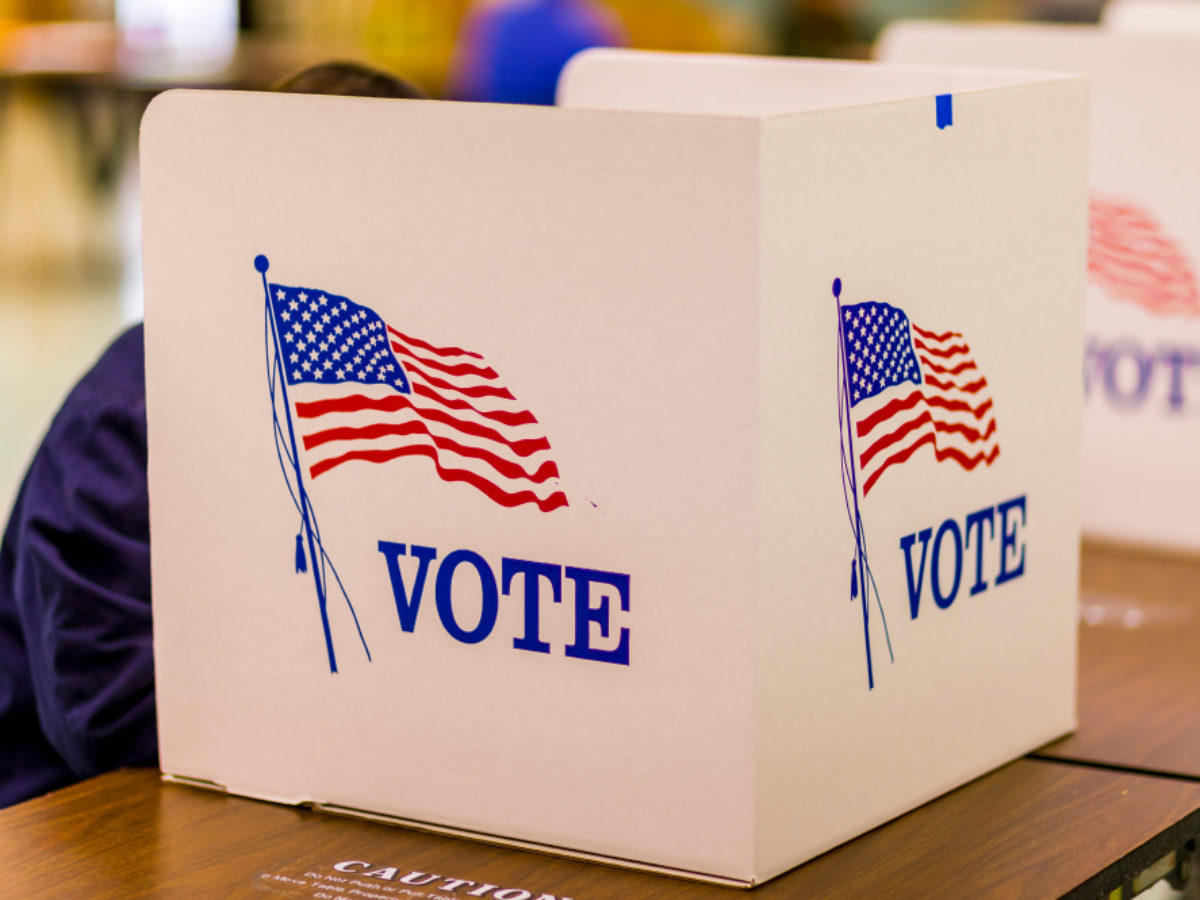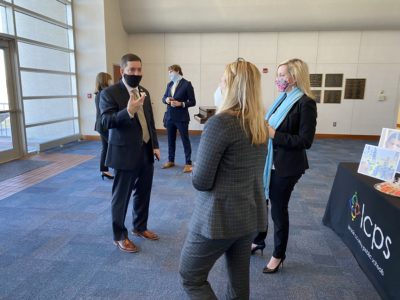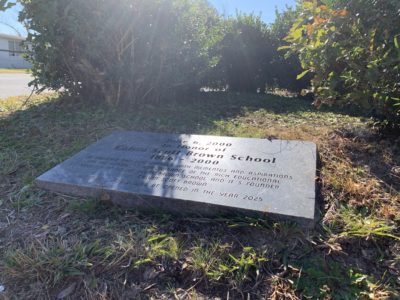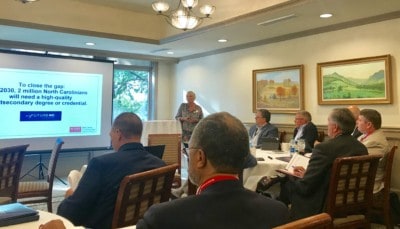
After 39 years in education in Carteret County, Mat Bottoms resigned as superintendent of Carteret County Schools effective December 31, 2019. In a letter originally published by the Eastern Beacon, Bottoms explained how prior to 1992, the Carteret County Board of Education was partisan. But, Bottoms said that in 1992, the county voted to change board of education elections to nonpartisan.
“The following years saw truly cohesive boards working in concert with the educators of the county to bring the students of Carteret County to new heights. Carteret County Schools is, without a doubt, one of the premier school systems in the state. We should all be proud of this accomplishment,” he wrote.
In 2017, however, Bottoms noted that the law changed and Carteret County Board of Education elections again became partisan.
“This past year has seen a rapid return to the political machinations of pre-1992,” he wrote. “With the current climate, I feel I am no longer in a position to be an effective leader for the students and educators of Carteret County.”
How are local school boards formed?
According to state statute, local school board elections are supposed to be nonpartisan. What does that mean exactly? As opposed to other races you may be used to voting for, “Republican” or “Democrat” are not listed under a candidate’s name on the ballot to indicate their political party.
That being said, any time they desire, lawmakers in the General Assembly can change that, either with local bills that change the rules for particular districts, or statewide bills that can transform the situation for the whole state. So far, lawmakers have only successfully acted locally, but efforts to make these local education elections partisan have been ramping up.
In 2015, out of 115 school districts, only 16 boards of education in North Carolina were chosen on a partisan basis. Now, there are 39. The rest are elected on a nonpartisan basis, except for two, which are appointed: Asheville City Schools and Thomasville City Schools.
Here is a list of current partisan school boards from the North Carolina School Boards Association. Below is a map with information EducationNC compiled on school board elections in all 115 districts, including if they are partisan or nonpartisan, elected or appointed, and more.
In the current legislative session, there is a bill that could change Asheville’s school board from appointed to elected, though it would be a nonpartisan election. There are also bills this session attempting to change other localities’ board of education elections to partisan ones.
According to Terry Stoops, director of the Center for Effective Education at the John Locke Foundation, the move toward more partisan school board elections isn’t such a bad thing.
“We can’t assume that a voter is going to have knowledge of the candidates before they cast a vote,” he said. “And the partisan designation simply provides the information that most voters will not have before they enter the voting booth.”
Jack Hoke, executive director of the North Carolina School Superintendents’ Association, said that politics can create complications.
“I think there’s a potential for a partisan board to prioritize a goal of the party that might not be in line with the district’s educational priorities,” he said.
Bottoms, the former Carteret County Schools superintendent, believed that having a partisan school board could make the relationship between board and superintendent trickier. So does Stewart Hobbs.
Tensions between boards and superintendents
Hobbs has worked as a superintendent in multiple school districts, including Sampson County Schools, Stokes County Schools, Yadkin County Schools, and Clinton City Schools. He officially retired in 2013, but he pops up from time to time, serving as an interim superintendent in districts that need leadership during transitions. He most recently served as an interim superintendent in Sampson County until February 2021.
Hobbs said that the growth of partisan school boards has put superintendents in the crosshairs of boards with different politics.
“Now it is you side with the left and you side with the right, and if you don’t align with that, we’re gonna get rid of you,” he said.
He also said that relationships between school boards and superintendents weren’t necessarily hunky dory before the growth of partisanship on boards, but they weren’t necessarily bad either.
“I’ve had a school board where I never got a 7-0 vote, except when I announced I was retiring,” Hobbs said, adding later: “Then I’ve had other school boards … that our board meetings lasted 30 minutes, and they said ‘We hired you to run the school system,’ and they said ‘That’s what we’re going to do.’ That was a great board to work with.”
While Bottoms, the former Carteret County superintendent, had a high-profile dust-up with his partisan board of education, sometimes relationships sour publicly even with nonpartisan boards.
Back in January 2020, Johnston County Superintendent Jim Causby resigned. In a written statement, he said that when he agreed to come to Johnston County, he said he needed to be able to “make decisions and oversee the daily operations of the school system.”
He continued, “However, I also discussed with the Board of Education of Johnston County Public Schools that at any time I believed the Board or individual Board members would not allow me to effectively perform my job as Superintendent, that I would no longer agree to continue in this role. I believe that there are members of the Board who have fully supported me and I appreciate them. However, there are roadblocks and interference by others on the board which have impeded my ability to effectively fulfil my role as Superintendent.”
Hobbs said relationships between boards and superintendents would be smoother if school boards knew what they were elected to do.
“If you go back and you look … the only authority that school boards have is to set policy,” he said. “Now they think they have all this other power, which they don’t.”
According to state general statute 115C-47 (1), “It shall be the duty of local boards of education to provide students with the opportunity to receive a sound basic education and to make all policy decisions with that objective in mind, including employment decisions, budget development, and other administrative actions, within their respective local school administrative units, as directed by law.”
Hoke pointed out this statute and added that it’s the school board that gets to hire and fire a superintendent. But he said that after the school board has done its job, it should allow superintendents to run the district on a day-to-day basis.
“The relationship between superintendent and school boards should be one of respect and trust. It should be a climate of joint communications and sharing of ideas,” he said.
The times, they are a-changin’
According to Leanne Winner, executive director of the North Carolina School Boards Association, her organization has no position on if a local district wants to make its school board partisan. But the association does oppose statewide bills trying to make all school board elections partisan.
“We have opposed those on the grounds that we believe that it needs to be a local discussion for that community,” she said.
And she said there have been a lot of changes in school boards in modern times, some driven by the increasing number of partisan elections and some just by the passage of time.
Back in the ’70s, ’80s, and even into the ’90s, she said it was much more common to see school board members who had served for 20 years or longer.
“Boards in general, regardless of how they are elected, we do not see the types of longevity that we used to see in school board members,” she said.
But she does think there have been some changes unique to the increase in partisan school boards.
“There seems to have been more turnover on the boards that are partisan, both when they become partisan and even looking at the boards that have always been partisan,” Winner said.
Carr Ipock is one school board member who worries about what a partisan school board will bring. He has been a member of the Craven County Board of Education since the ’90s. During his first election, the board was partisan, but shortly thereafter, it changed to nonpartisan. Now, the county’s Board of Commissioners is seeking to get that changed back.
He wrote the following to explain why he thinks the board should remain nonpartisan.
He lists a number of reasons in favor of having a nonpartisan school board. And he also wrote about how education at the board level isn’t ideologically driven in his district.
“In my time on the board (28 years) with 24 as elected nonpartisan, I have not witnessed discussions or decisions that were party-oriented,” he wrote. “At the same time, we have had people at the dais whose party affiliation covered all the choices.”
In a follow-up interview, he questioned why the change is being sought.
“I’m not sure what problem they’re trying to fix,” he said. “Maybe to rectify that in a majority county, you don’t have a minority leadership on a school board.”
The makeup of his board is majority people of color, as is the board’s leadership, but the majority of Craven County is white, accord to Census data.
The majority of the board both in the past and present is also Democrat, Ipock writes in the document, though he also notes that the board’s previous chairman was not.
Stoops, from the John Locke Foundation, said that wishing that local board of education elections had nothing to do with ideology is wishful thinking.
“Even when there is no explicit political party, I think there is an acknowledgement that the members of the school board have allegiances that align with one of the political parties,” he said, adding later: “I’ll even go as far as to say that it’s a fantasy to believe that just because you don’t designate the political party that somehow political parties are not involved in the races.”
Cabarrus County Schools Superintendent Chris Lowder’s resignation in February 2021 almost certainly had something to do with politics, even though his local board of education is elected on a nonpartisan basis. Shortly before he left, a group of parents protested and called for his resignation because, they said, political conversations were showing up in district schools.
The official word was that Lowder could have retired back in September but stayed to help the district navigate the pandemic, according to this article. But, according to the Independent Tribune, Lowder extended his contract in 2020 with the district through 2024. Because he resigned early, the district had to pay him $458,000 per a stipulation in his contract.
Winner said that partisan or not, what superintendents need to understand is that the relationship between them and the school board is a “two-way street.” She said the board has to know its roles and responsibilities, as does the superintendent, but they also have to try to understand each other.
“It’s important for superintendents to understand what board members are having to deal with within their own communities and the dynamics within the board itself. And that can be tricky at times,” she said. “And to communicate. Communicate, communicate, communicate. I think you can never communicate too much. You can clearly communicate too little.”
Behind the Story
Noah de Comarmond completed the research and compiled the data in the map. Analisa Sorrells created the map. Alex Granados did the reporting.
Recommended reading




